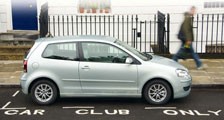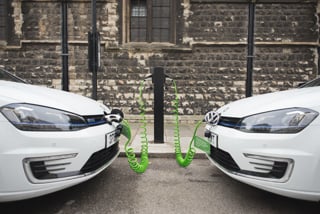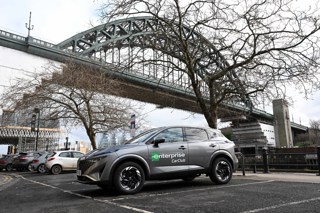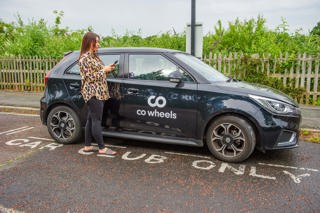Car clubs have enjoyed double-digit growth within the corporate sector over the past year as business increasingly look to drive down costs and reduce their reliance on employees' own vehicles.
Car clubs provide employers with a self-service - but fully managed - car or van pool which is located in dedicated parking bays either on-street or within an organisation’s car park or site.
The growth of this market has been deemed so significant that the Carplus Trust - which publishes an annual survey monitoring car clubs - has now begun assessing corporate use in its own right for the first time.
In total, 486 different British businesses and other organisations with fleets responded to Carplus' 2013/14 survey.
Carplus Trust’s chief executive Chas Ball said: “One of the things that’s becoming clear from this survey is that the generic case for the use of properly managed car sharing schemes is now being rapidly taken up by corporate users.
“In addition to bringing cost benefits these schemes also provide opportunity to improve efficiencies within organisations.”
Around 80% of those businesses who responded to the survey are in the private sector with 65% employing less than 10 staff.
Of these, 229 were based in London, 216 were located in England and Wales while the remaining 41 respondents were from Scotland.
In England and Wales, 41% of respondents stated that they used their own car for business travel at least once a week before joining the car club and this figure fell to 24% after joining.
Of these, 35% stated that pool cars had been replaced by car club cars and 29% stated that employees were now actively discouraged from using their own cars.
The survey also found that corporate car club membership appears to benefit employees who need access to a car on an occasional basis rather than for "regular" trips with 29% of business users stating that they use a club car at least once a week and 28% once a month.
Most of this travel is made by car club cars (96%) rather than vans (4%).
When those operating the schemes on an organisation’s behalf were asked to rate their overall satisfaction with the level of service provided by their car club operator, 90% said that the service was either "good" or "very good" - with the remaining 10% saying it was "average".
These figures were similar to those corporate members in London among whom there was 88% satisfaction.
Of the 229 businesses in London that replied to the survey, 17% said that they were able to stop using employees’ own cars for work purposes after signing up to the car sharing scheme.
And the availability of car club schemes have also diverted the amount of journeys being made in rented or leased vehicles by 21%.
However, there was a reduction of just 3% in the use of pool cars as a result of car clubs which is attributed to many organisations introducing car sharing as a way of reducing their reliance on grey fleet.
Ball said: "Membership of a car club in London also appears to slightly decrease respondents’ use of public transport and taxis for business use.
"Despite this observation, corporate car club membership does facilitate the use of public transport for the commute to work by removing the need for an employee to bring his or her car to work in order to use it during the working day.
"I think that the survey has highlighted the role of a corporate car club as a complement to other modes - rather than a single solution to an employer’s travel needs.
"Depending on the size of an organisation, between 12% and 17% of those running the schemes highlighted reduced CO2 emissions as a benefit arising from corporate car club membership.
“These figures perhaps highlight that financial motivations are currently stronger than environmental ones for administrators of corporate car club accounts.
"But car club fleets are, on the whole, comprised of modern, efficient and frequently maintained vehicles while a ‘grey fleet’ of employees’ own cars is also likely to contain a variety of vehicles of varying fuel efficiency and safety.”
Ball highlighted the fact that there are currently no government departments signed up to car sharing schemes as an example of the sector’s potential for continued strong growth.
All the main car club operators in Britain - namely: Zipcar; City Car Club; Co-wheels; E-car; Enterprise CarShare; Hertz 24/7; and various community car club operators - took part in Carplus’ 2013/14 survey.
Andrew Edgar, director Zipcar for Business – which accounts for around 60% of the total car sharing schemes in Britain – said: “The use of our vehicles by corporate and local authority users has been the fastest growing part of our business in London.
“There’s been double-digit year-on-year growth in this area and we see no signs of it slowing down.
“For many businesses operating in London and other major cities the use of car sharing schemes simply makes sense.
“They will only pay for those hours they use a car or van and if they have pool cars they’re frequently left unused on their premises unless they’re operating a 24 hour a day operation.
“We’re also able to help them if they need to scale the number of cars or vans they’re operating up or down and those running the schemes don’t have to worry about managing the books, handing keys over, checking the tyres and oil – and much more besides.”
In addition to operating across Greater London, Zipcar – which is owned and operated by Avis - also runs car clubs in Oxford, Cambridge and Bristol.
Neil Cunningham, general manager for Hertz UK and Europe, said he is also witnessing increased uptake of the Hertz 24/7 scheme.
He said: "Many of our corporate partners are recognising the convenience, flexibility and financial benefits of using Hertz 24/7 technology enabled vehicles for their pool fleets and for private car clubs.
"The study conducted by Carplus shows that each car club vehicle effectively replaces approximately 14 private vehicles from the road, resulting in reduced traffic congestion, demand for parking spaces, fuel consumption, and CO2 emissions.
“In short, there are many benefits for business and private users.”
Car clubs – their benefits to businesses
The most frequently cited benefit of car clubs to organisations in Carplus' survey for 2012/13 was financial considerations.
Carplus decided to explore this in more detail in this year's survey by asking respondents in more detail what the perceived financial benefits of car clubs were.
The most common responses included:
• A reduction in claimed business mileage
• A reduced administration burden
• A reduction in the amount of parking required - particularly for smaller organisations
Other benefits recorded by those running the schemes were improved employee satisfaction and, particularly for medium-sized organisations, enhanced staff mobility.
Frequency of use of car clubs among the 229 businesses and other organisations with fleets in London that responded to Carplus' survey:
Once a week or more - 20%
Once a month or more - 34%
At least once every two months - 24%
At least once per year - 21%
No response - 1%
Perceived financial benefits of joining a car club in London
Reduction in claimed business mileage:
Fewer than 10 employees - 25%
10 - 99 employees - 35%
100+ employees - 35%
Reduced administration burden
Fewer than 10 employees - 19%
10 - 99 employees - 43%
100+ employees - 29%
Reduced parking required
Fewer than 10 employees - 22%
10 - 99 employees - 4%
100+ employees - NA
Other perceived benefits of joining a car club in London
Enhanced staff mobility
Fewer than 10 employees - 40%
10 - 99 employees - 57%
100+ employees - 6%
Improved employee satisfaction
Fewer than 10 employees - 32%
10 - 99 employees - 30%
100+ employees - 12%
Reducing CO2 Emissions
Fewer than 10 employees - 17%
10 - 99 employees - 17%
100+ employees - 12%
Reduced business miles
Fewer than 10 employees - 15%
10 - 99 employees - 4%
100+ employees - 18%
Risk management benefits
Fewer than 10 employees - 5%
10 - 99 employees – NA
100+ employees - 6%





















Login to comment
Comments
No comments have been made yet.